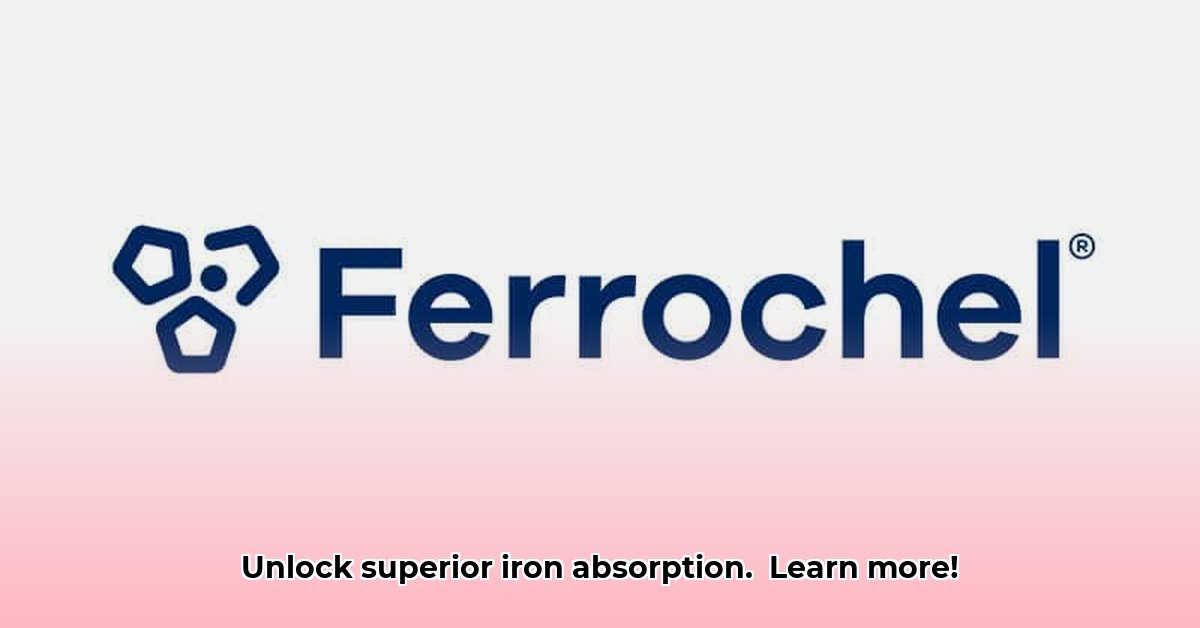Are you constantly battling fatigue? An iron deficiency might be the underlying cause, impacting not only your energy levels but also your cognitive function. Navigating the world of iron supplements to find the right one can be overwhelming. This comprehensive review explores Ferrochel, delving into the scientific principles behind it, comparing it with alternative options, and examining its advantages and disadvantages based on thorough research. By the time you finish reading, you’ll possess a clear understanding of how Ferrochel can effectively elevate your iron levels and improve your overall well-being.
Understanding Ferrochel: A Modern Approach to Iron Supplementation
Ferrochel stands out from traditional iron supplements due to its unique formulation and enhanced absorption capabilities. The key lies in its chelated structure. Chelation involves binding iron to amino acids, which dramatically improves its absorption rate in the body. This process is crucial because unabsorbed iron is essentially wasted, failing to provide the intended health benefits. Moreover, many individuals recall older iron supplements causing unpleasant gastrointestinal issues, such as constipation, nausea, and general stomach discomfort. Clinical studies indicate that Ferrochel significantly reduces the risk of these side effects, making daily iron supplementation a more comfortable and sustainable practice.
Research-Backed Insights: Bioavailability and Effectiveness of Ferrochel
Both the manufacturer and multiple independent studies suggest that Ferrochel exhibits superior bioavailability when compared to traditional, inorganic iron salts. Bioavailability refers to the extent to which a substance can be absorbed and utilized by the body. Specific research indicates that Ferrochel boasts an impressive bioavailability of 90.9%, while ferrous sulfate, a common alternative, has a bioavailability of only 26.7%. This substantial difference highlights Ferrochel’s ability to replenish iron stores more effectively.
Furthermore, research has consistently demonstrated that Ferrochel supplementation leads to improvements in hemoglobin (an oxygen-carrying protein in red blood cells) and ferritin (a protein that stores iron) levels in individuals diagnosed with iron deficiency. Ferrochel appears to be highly effective in combating iron deficiency anemia, a condition frequently linked to persistent low energy levels. However, it’s essential to acknowledge that ongoing research is continuously expanding our knowledge of iron supplementation.
Ideal Candidates: Who Can Benefit Most from Ferrochel?
The benefits of Ferrochel extend to a diverse range of individuals, including pregnant women, growing children, and athletes–all of whom have heightened iron requirements. Individuals following vegetarian or vegan diets, who often struggle to obtain sufficient iron from plant-based sources due to the presence of phytates (compounds that inhibit iron absorption), may find Ferrochel particularly advantageous. Thanks to its unique chelated structure, Ferrochel can bypass the inhibitory effects of phytates, providing a reliable source of iron for those adhering to plant-based lifestyles.
Potential Limitations: Addressing the Drawbacks
While the scientific evidence supporting Ferrochel is generally positive, several important considerations should be taken into account. Direct comparisons against every iron supplement available on the market are not always accessible, making it difficult to definitively claim that Ferrochel is universally superior in all situations. Cost is yet another factor, as Ferrochel typically carries a higher price tag than traditional iron supplements. Although many individuals may find the increased effectiveness justifies the higher cost, it could pose a barrier for some. Lastly, the long-term effects of Ferrochel supplementation are still being investigated. While short-term benefits are well-documented, ongoing research is crucial for solidifying our understanding of its long-term impact.
Future Directions: Ongoing Studies and Accessibility Initiatives
The future of Ferrochel appears promising. Ongoing research continues to provide a more comprehensive understanding of its role in iron supplementation and overall health. Future studies are expected to include in-depth, head-to-head comparisons with other iron supplements, potentially leading to even stronger evidence supporting its effectiveness. Additionally, efforts to enhance its availability and reduce manufacturing costs could make Ferrochel more accessible to a wider population in the future.
Ferrochel vs. Traditional Iron Supplements: A Comparative Overview
| Feature | Ferrochel | Traditional Iron Supplements (e.g., Ferrous Sulfate) |
|---|---|---|
| Bioavailability | Significantly higher (studies show up to 90.9%) | Lower (as low as 26.7% reported) |
| Gastrointestinal Discomfort | Commonly minimal | Frequently reported (e.g., constipation, nausea, stomach upset) |
| Suitable for Plant-Based Diets? | Excellent | Absorption can be challenging due to phytates |
| Cost | Generally more expensive | Generally less expensive |
Important Note: Before initiating any new supplement regimen, consult with your doctor or a qualified healthcare professional. They can assess your specific needs and determine whether Ferrochel is the appropriate choice for you, including determining the correct dosage.
Comparing Ferrochel Iron Supplement Bioavailability to Other Iron Supplements
Key Takeaways:
- Ferrochel (ferrous bisglycinate chelate) and ferrous sulfate both provide elemental iron; however, Ferrochel offers superior absorption rates.
- Studies consistently show Ferrochel’s enhanced bioavailability, resulting in greater effectiveness, even when administered at lower doses.
- Ferrochel’s chelated structure effectively shields iron from degradation, enhancing absorption while minimizing potential side effects.
- Due to the absence of a direct conversion factor between Ferrochel and ferrous sulfate dosages, individualized dosing recommendations are crucial.
- Additional research is necessary to establish a precise conversion factor, facilitating easier transitions between different supplements.
Unpacking Iron Absorption: The Distinction Between Ferrochel and Ferrous Sulfate
Iron plays a vital role in the production of red blood cells and contributes significantly to overall energy levels. Therefore, maximizing iron absorption from supplements is crucial. Understanding the concept of bioavailability is essential. How do Ferrochel iron supplement bioavailability compare to other iron supplements? Let’s compare Ferrochel and ferrous sulfate. Both provide elemental iron (approximately 20% by weight), but their absorption rates differ significantly.
Ferrochel’s advantage resides in its unique structure. As a chelated form of iron, it’s bound to the amino acid glycine. This chelation safeguards the iron from degradation in the stomach and intestines, facilitating enhanced absorption. Ferrous sulfate, in contrast, is a simpler, less-protected form, making it more vulnerable to interactions with other compounds in the digestive tract that can impede absorption.
Think of it this way: Ferrous sulfate is akin to transporting unprotected cargo, making it susceptible to damage. Ferrochel resembles a container carrying cargo, ensuring safe arrival in your bloodstream. Does Ferrochel represent the optimal choice for iron supplementation?
Quantifying Bioavailability: Measuring Absorption Rates
Numerous studies indicate that Ferrochel exhibits significantly higher bioavailability than ferrous sulfate. This implies that a more significant portion of the iron in Ferrochel is absorbed and utilized by the body. One study revealed that Ferrochel’s bioavailability was 3.7 times greater than that of ferrous sulfate. Other studies have reported even more pronounced differences. While both supplements can elevate hemoglobin and ferritin levels (indicators of iron stores), these improvements are frequently achieved with lower doses of Ferrochel.
Minimizing Side Effects: A Question of Tolerance
A common complaint associated with ferrous sulfate is gastrointestinal distress, encompassing symptoms such as nausea, constipation, and stomach upset. These adverse effects are linked to the poor absorption and irritation triggered by ferrous sulfate’s iron release in the gut. Ferrochel’s protective chelation significantly mitigates these side effects, resulting in improved tolerability and making it a favored choice for individuals who are sensitive to iron supplements.
Dosage and Individualization: Customizing Iron Intake
Even with Ferrochel’s evident absorption advantages, a direct conversion factor for dosages compared to ferrous sulfate remains elusive. A healthcare professional should determine the appropriate dosage based on your specific needs, health status, and blood work results. Consulting a healthcare provider before commencing any iron supplement regimen is crucial.
Summing Up: Making Informed Choices About Iron
Selecting the right iron supplement necessitates considering individual needs and potential side effects. How Ferrochel iron supplement bioavailability compares to other iron supplements is best addressed in consultation with your healthcare provider. The available research suggests that Ferrochel’s superior bioavailability and tolerability make it an excellent option for those seeking effective iron supplementation.
Ferrochel for Pregnant Women: Addressing Nutritional Deficiencies
Key Takeaways:
- Ferrochel, a brand of ferrous bisglycinate, demonstrates superior iron absorption when compared to traditional iron salts.
- This enhanced absorption leads to higher hemoglobin levels and significantly fewer gastrointestinal side effects in pregnant women.
- While further research is needed to fully evaluate Ferrochel’s impact on ferritin levels, its benefits for hemoglobin are well-established.
- Considering “Ferrochel for Pregnant Women: Addressing Nutritional Deficiencies,” it provides a safe and effective means of addressing iron deficiency during pregnancy.
- Additional research is required to confirm whether similar benefits are observed in non-pregnant populations.
Pregnancy and Iron: A Critical Connection
During pregnancy, iron needs increase substantially to support the developing fetus and the mother’s growing blood volume. Iron deficiency during pregnancy can lead to various complications. Supplementation with an iron supplement is often recommended, but which type offers the best benefits with the fewest unwanted side effects?
Exploring the Benefits of Ferrochel
What makes Ferrochel so effective? The answer lies in its chemical structure. It’s a chelated form of iron known as iron bisglycinate. Chelation protects the iron from degradation in your stomach, leading to enhanced absorption. Traditional iron supplements often cause digestive upset, an issue that Ferrochel tends to minimize. Would this have an impact on taking supplements?
Meta-Analysis: Evaluating the Evidence
Numerous
- Stainless Food Storage Keeps Your Kitchen Organized And Meals Fresh - February 28, 2026
- Stainless Steel Food Storage for Healthier, Eco-Friendly Meal Prep - February 27, 2026
- Stainless Food Containers Offer Durable Storage for Everyday Meals - February 26, 2026










